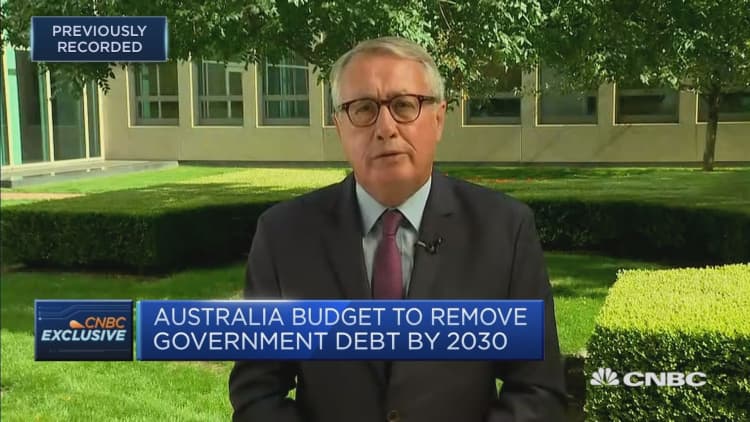
Several Australian opposition politicians hit out at the ruling government for proposing a federal budget that, as they claim, focuses on winning an upcoming election instead of driving economic growth in the coming years.
The government on Tuesday offered 158 billion Australian dollars ($112.18 billion) in tax cuts over the next decade aimed primarily at middle-income earners. The proposal also included an increase in infrastructure spending targeted at rural areas, which are said to hold an important voter base for the ruling coalition. Despite those measures, the government is projecting a return to a budget surplus for the first time in 12 years.
"It doesn't deal with the cause of very weak consumption in the Australian economy, which is basically a lack of wage growth and insufficient investment, private and public, in the infrastructure of the nation," former Australian deputy prime minister, told CNBC's "Squawk Box" on Tuesday.
"And that's why the budget, I think, is a wasted opportunity. It's a short-term election spendathon rather than a medium- and long-term plan for the future of the country," added Swan, who's the national president of the Australian Labor Party, the country's main opposition party.
Australia's government is primarily made up of two conservative parties: the Liberal Party of Australia and the National Party of Australia. The coalition, led by Prime Minister Scott Morrison, is trailing left-leaning Labor in opinion polls. An election is expected to be held in May.
The proposed budget will only be presented and put up for voting in Parliament if the conservative coalition wins the election.
Australia has avoided a recession for close to three decades and is expected by economists to extend that record. But growth has slowed in recent quarters, with a limited rise in wages and a fall in household wealth putting a lid on how much private consumption can lift the economy, economists said.
For his part, Australian Finance Minister Mathias Cormann touted the proposed cuts in income taxes as a solution to challenges facing the economy — with or without an upcoming election.
"This is a continuation of our long-term plan to provide the right incentive and reward for effort by hardworking Australians, but also to help low- and middle-income earners with cost-of-living pressures and to reform tax system to facilitate stronger growth into the future," he told CNBC's Will Koulouris.
What analysts say
Many analysts agreed there was a political consideration in the way the budget was drafted, and some questioned whether the tax cuts will be enough to lift consumption in Australia.
"In light of falling housing wealth, there's a risk that the additional income may be saved rather than spent," Marcel Thieliant, an economist at consultancy Capital Economics, wrote in a Tuesday note.

Ratings agency Moody's kept its highest possible AAA-rating for Australia after the budget announcement. It said overall spending "has remained contained" while the government has continued to support the economy. The agency also flagged risks, however.
"We expect the world economy to be slower, China's economy to slow over this year to 6 percent growth," Martin Petch, vice president and senior credit officer at Moody's Investors Service, told CNBC's "Squawk Box" on Tuesday.
A softer external environment would hit Australia's economy, he added. On top of that, he said, there's a chance that commodity prices, employment growth and tax revenue may not be as strong as what the budget projected.


